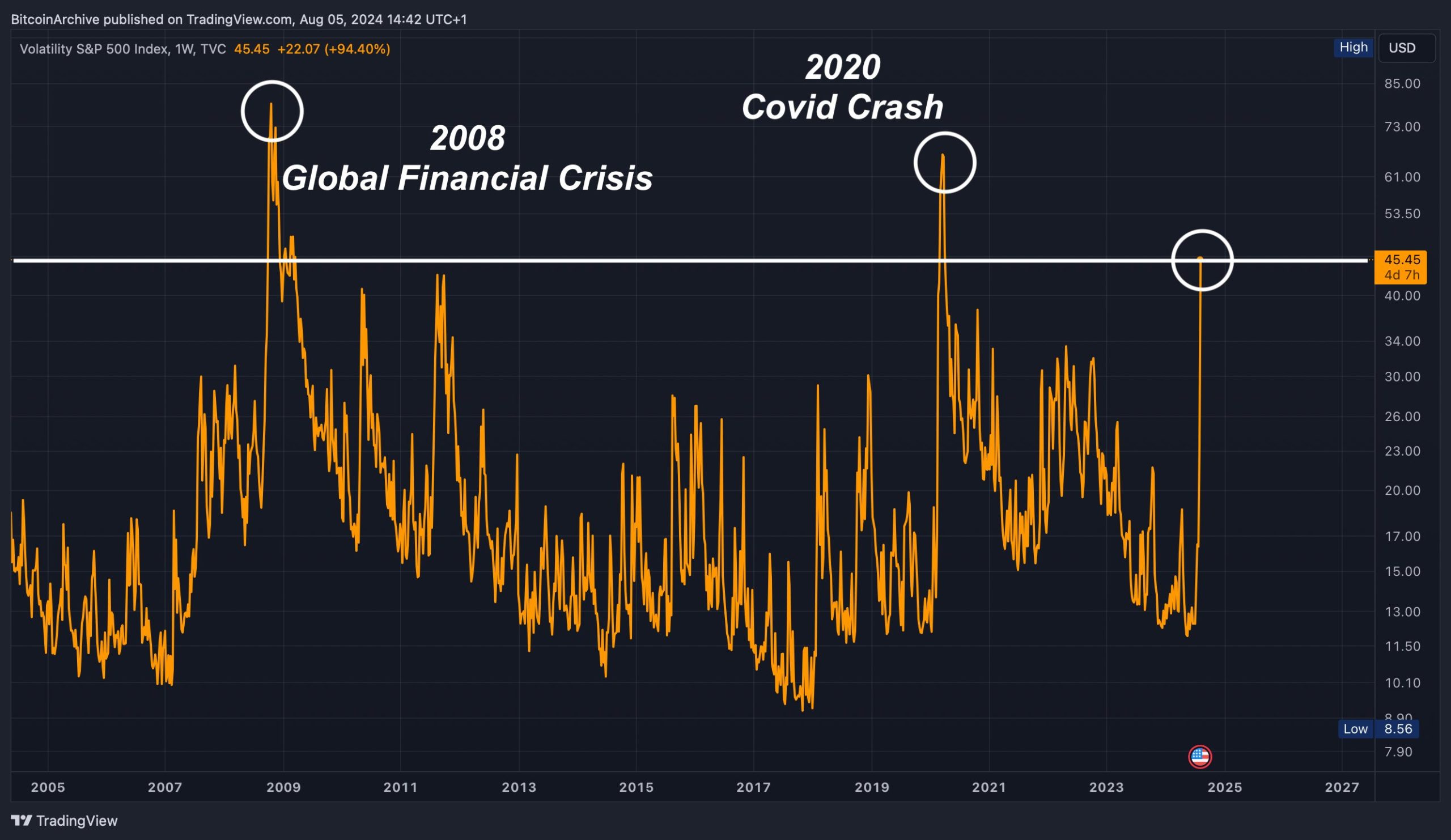Market Volatility Hits Highest Level Since COVID Crash
06.08.2024 7:30 2 min. read Alexander Stefanov
The cryptocurrency market reacted swiftly to the global economic downturn over the weekend, with predictions of continued instability.
Bohan Jiang, Head of OTC Options Trading at Abra, noted that volatility in the crypto space is expected to remain high until broader economic conditions improve.
Recent market behavior caught many off guard, as traders had not been preparing for a downturn. Before the market shift, there was a strong focus on bullish trends, with Bitcoin and Ethereum showing increased implied volatility in anticipation of major events like Trump’s Bitcoin speech and the launch of Ethereum ETFs.
The recent economic turmoil has led to a sharp rise in the CBOE Volatility Index (VIX), which surged to over 65 points, its highest since the early COVID-19 market panic and second highest after the 2008 crisis.
This spike reflects the surprise and disruption within the derivatives market, where volatility had been aggressively sold off following market events.
Bob Wallden from Abra pointed out that the cryptocurrency market was slow to adapt to the changing macroeconomic conditions, remaining skewed towards positive movements with insufficient downside hedging. This has resulted in a significant drop in Bitcoin and Ethereum funding rates, marking a sharp decline in profitability for market trades.
The current market turmoil is linked to multiple factors, including a surge in the Japanese yen, disappointing U.S. jobs data, concerns about the Federal Reserve’s ability to manage the economy, and the deflating AI bubble. The yen’s rise has particularly contributed to increased volatility as traders unwind carry trades.
Bitfinex analysts suggest that the crypto sell-off is driven by these macroeconomic issues, with potential support expected around $48,900. Without a shift towards bullish momentum, this support level may face further tests depending on the macroeconomic landscape.
-
1
Trump Imposes 50% Tariff on Brazil: Political Tensions and Censorship at the Center
10.07.2025 7:00 2 min. read -
2
Key Crypto Events to Watch in the Next Months
20.07.2025 22:00 2 min. read -
3
USA Imposes Tariffs on Multiple Countries: How the Crypto Market Could React
08.07.2025 8:30 2 min. read -
4
UAE Regulators Dismiss Toncoin Residency Rumors
07.07.2025 11:12 2 min. read -
5
Ripple Selects BNY Mellon as Custodian for RLUSD Stablecoin Reserves
09.07.2025 15:28 2 min. read
Two Upcoming Decisions Could Shake Crypto Markets This Week
The final days of July could bring critical developments that reshape investor sentiment and influence the next leg of the crypto market’s trend.
Winklevoss Slams JPMorgan for Blocking Gemini’s Banking Access
Tyler Winklevoss, co-founder of crypto exchange Gemini, has accused JPMorgan of retaliating against the platform by freezing its effort to restore banking services.
Robert Kiyosaki Warns: ETFs Aren’t The Real Thing
Renowned author and financial educator Robert Kiyosaki has issued a word of caution to everyday investors relying too heavily on exchange-traded funds (ETFs).
Bitwise CIO: The Four-Year Crypto Cycle is Breaking Down
The classic four-year crypto market cycle—long driven by Bitcoin halvings and boom-bust investor behavior—is losing relevance, according to Bitwise CIO Matt Hougan.
-
1
Trump Imposes 50% Tariff on Brazil: Political Tensions and Censorship at the Center
10.07.2025 7:00 2 min. read -
2
Key Crypto Events to Watch in the Next Months
20.07.2025 22:00 2 min. read -
3
USA Imposes Tariffs on Multiple Countries: How the Crypto Market Could React
08.07.2025 8:30 2 min. read -
4
UAE Regulators Dismiss Toncoin Residency Rumors
07.07.2025 11:12 2 min. read -
5
Ripple Selects BNY Mellon as Custodian for RLUSD Stablecoin Reserves
09.07.2025 15:28 2 min. read



